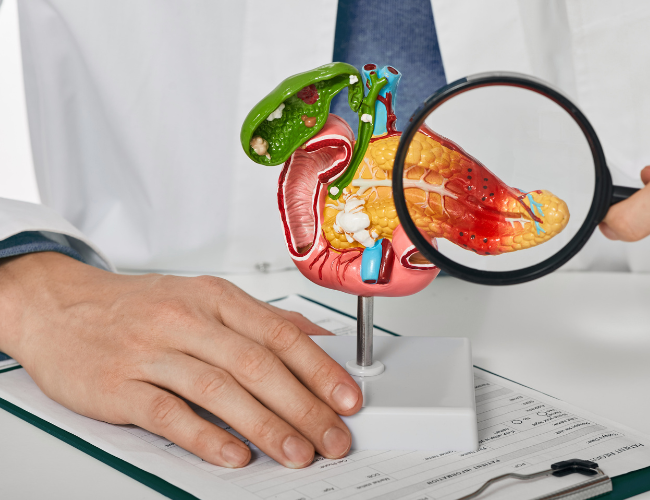Pancreatitis has been in the news cycle lately as celebrities like Travis Barker and Maria Menounos have opened up about their health complications with pancreatitis and pancreatic cancer, respectively.
Pancreatitis can be a serious and painful experience that affects the quality of life. In this article, we will talk about the causes, symptoms, and treatments available for pancreatitis, so you can be aware of this condition and know what signs to look for in your own body.
What Is Pancreatitis?

The pancreas is an organ located behind the stomach, next to the small intestine. It performs two main functions: producing enzymes that help break down food in the intestines and releasing hormones to regulate blood sugar levels.
When the pancreas becomes inflamed, it can cause pain and other symptoms associated with pancreatitis.
Your stomach takes in food, and your pancreas — a small organ located behind your stomach, next to your small intestine — helps digest it. It releases digestive enzymes to help process food and releases glucagon and insulin, which help your body break down food into energy.
“Pancreatitis occurs when digestive enzymes become activated while still in the pancreas, irritating the cells of your pancreas and causing inflammation,” according to the Mayo Clinic.
Acute vs. Chronic Pancreatitis
Pancreatitis can be acute or chronic. Acute pancreatitis occurs suddenly and lasts for a short time. It can range from mild discomfort to severe pain, sometimes requiring hospitalization.
Chronic pancreatitis is a long-standing inflammation that damages the pancreas permanently over time. This type of pancreatitis often results in permanent damage to the pancreas, leading to a reduction in enzyme production and hormone secretion.
What Typically Causes Pancreatitis?

Gallstones account for up to 70 percent of cases of acute pancreatitis, according to an UpToDate article written by Santhi Swaroop Vege, MD.
Up to 25 percent of acute cases are linked to chronic alcohol overuse. Medications, high triglyceride levels, cystic fibrosis, high calcium levels, infection, and injury are all other possible causes for the issue, reports the Mayo Clinic.
Alcohol Consumption
Heavy drinking, especially over a prolonged period, is a leading cause of pancreatitis. Excessive alcohol intake can lead to inflammation of the pancreas, impairing its ability to function correctly.
Gallstones
Gallstones, which are hardened deposits of digestive fluid, can block the pancreatic duct and cause inflammation. This blockage can result in sudden and severe abdominal pain, a symptom commonly associated with pancreatitis.
High Triglyceride Levels
High levels of triglycerides, a type of fat found in the blood, can also cause pancreatitis. This condition is called hypertriglyceridemia.
Abdominal Trauma
In some cases, injury to the abdomen, such as a car accident or sports injury, can lead to pancreatitis.
Infections and Medications
Certain infections, such as mumps, and medications like corticosteroids can also cause pancreatitis.
What Are the Symptoms of Pancreatitis?

Pancreatitis symptoms can vary from person to person, depending on the severity and duration of inflammation. Some common symptoms include:
- Abdominal Pain: The pain usually occurs in the upper abdomen and can radiate to the back or chest.
- Nausea and Vomiting: often accompanied by abdominal pain.
- Fever: A fever is a sign that the body is fighting an infection. In cases of acute pancreatitis, fever is a common symptom.
- Rapid Pulse: An elevated heart rate can be a sign of acute pancreatitis. When the pancreas becomes inflamed, it releases enzymes into the bloodstream, causing the heart to work harder.
- Respiratory Problems: In severe cases of pancreatitis, breathing difficulties may occur due to the inflammation’s effect on the diaphragm.
How Is Pancreatitis Treated?
The treatment for pancreatitis depends on the underlying cause and the severity of the inflammation. In mild cases, resting the pancreas by fasting and intravenous fluids may be enough to allow the organ to heal.
In more severe cases, hospitalization may be necessary, and treatments may include:
Pain Management
Pain management is essential in treating pancreatitis. Over-the-counter pain medications like ibuprofen or acetaminophen may be effective, but stronger prescription pain medication may be necessary in severe cases.
Nutritional Support
Pancreatitis can affect the body’s ability to digest food correctly. To manage this, the patient may need to receive nutrients via a feeding tube until the pancreas heals.
Surgery
If gallstones are causing the inflammation, surgery to remove the stones may be necessary. In chronic pancreatitis, surgery may be required to remove damaged or infected tissue.
Lifestyle Changes
Lifestyle changes can help prevent recurrence of pancreatitis. Avoiding alcohol and tobacco use, maintaining a healthy weight, and eating a low-fat diet can all help reduce the risk of developing pancreatitis.
Conclusion

Pancreatitis is a painful and sometimes life-threatening condition that affects the pancreas. Recognizing the symptoms and seeking prompt medical attention is essential for effective treatment.
Understanding the causes of pancreatitis, such as heavy alcohol consumption, gallstones, high triglyceride levels, abdominal trauma, infections, and certain medications, can help you take steps to prevent it. If you experience any symptoms associated with pancreatitis, seekmedical attention immediately.
Treatment for pancreatitis depends on the underlying cause and severity of inflammation, but options include pain management, nutritional support, surgery, and lifestyle changes.
It’s important to note that pancreatitis can be a challenging condition to diagnose accurately. Symptoms can overlap with other medical conditions, and sometimes the symptoms may not appear until the inflammation is severe.
If you have any concerns about your pancreas’s health, it’s always best to speak with your healthcare provider and get evaluated.
In conclusion, pancreatitis is a serious medical condition that requires prompt diagnosis and treatment to prevent complications.
Knowing the causes and symptoms of pancreatitis can help you recognize when to seek medical attention and take steps to prevent its recurrence. With proper treatment and care, many people with pancreatitis can manage their symptoms and live healthy, fulfilling lives.


